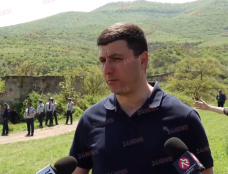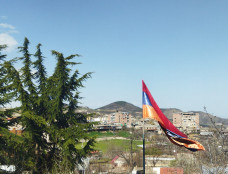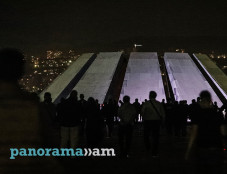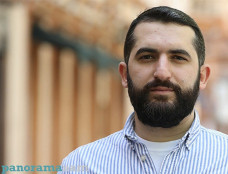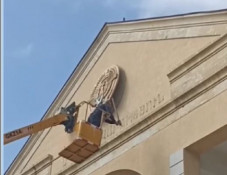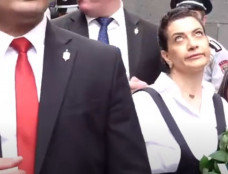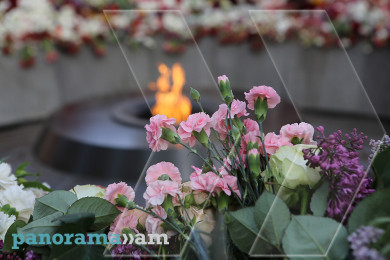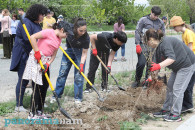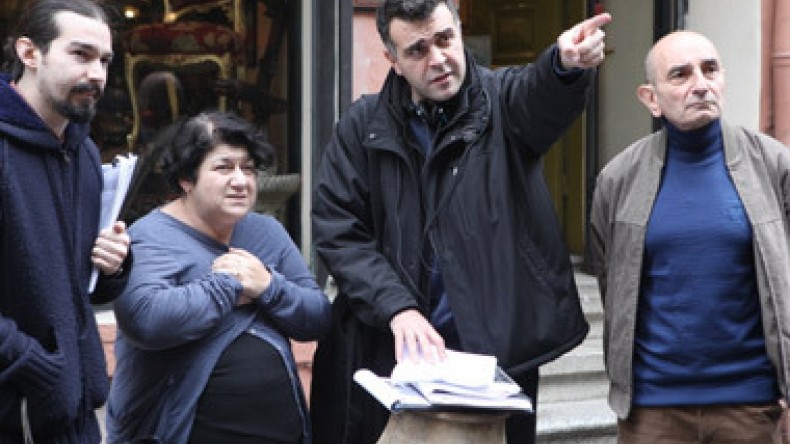
Filmmaker Eric Nazarian: On eve of 100th anniversary of Armenian Genocide we need a catharsis
“I’m not a soldier; my gun is my camera, and my pen.” Eric Nazarian’s words rung out across the lecture hall of the National Association for Armenian Studies and Research (NAASR) Center in Belmont, Mass., during his presentation on Thurs., May 2, according to The Armenian Weekly. His talk followed a screening of his short film, “Bolis,” part of an omnibus film project entitled, “Do Not Forget Me, Istanbul.” His declaration belies the power of his work to combat taboos about the Armenian experience, however. “Bolis” was the first Turkish film that employed the word “genocide” explicitly in reference to the Armenian Genocide of 1915; in fact, this was a condition of Nazarian’s involvement in the project. Speaking freely through images and words has been the theme of his career as a photojournalist, screenwriter, and filmmaker.
Born in 1976 in Hrazdan, Armenia, Eric Nazarian moved to the U.S. with his family at the age four. The move was a multi-legged journey, from Yerevan to Moscow, Rome, and Columbus, Ohio, before the family ultimately settled in Glendale, Calif. Nazarian’s grandparents, aunt, and uncle joined them less than a year later from Columbus via Louisiana. “There’s this quote I love by Kierkegaard the philosopher, who says, ‘You live life forwards, but you understand it backwards.’ And growing up I didn’t have any memories of my early childhood, but oddly, as I get older there are certain flashbulb memories that come to me of that time… I remember the sadness, I remember the bittersweetness, and I remember the cold of Moscow.”
In LA, Nazarian’s father opened a photography shop, while his mother worked as a dressmaker. Although growing up in the cinema-driven environment of LA surely helped, Nazarian believes that his love of telling stories through images would have developed regardless of his surroundings. He attributes this mainly to his father, Haik, who was the catalyst for his love of film. Nazarian compares his father to the main character of the film “Cinema Paradiso,” for the avid way Haik Nazarian watched movies as a child in the cinemas of Tehran.
Growing up, Eric Nazarian found his family’s love for film contagious. Prominent actors were discussed so consistently and familiarly that he thought they were family. “My whole life growing up, [these actors] were talked about so much that I swear to you, there was a part of my childhood when I thought that all these people, like Marlon Brando, that they were talking about so casually, I thought they were family. I thought someday I would meet them…literally I thought, ‘Yeah, one day Marlon’s gonna walk in that door, and we’re gonna have a good time and he’ll probably go drinking with my dad.’ I took it literally.”
Nazarian used to finish his homework and then record movies off of TV so that he could watch them with his father after he came home from work. “It was our bonding mechanism,” he says. These father-son interactions produced more than just bonding; Nazarian credits “everything in my life to my father’s love of images and storytelling… I’ve been blessed to have a family that supported and encouraged and nurtured the arts in the house. That encouragement gave me this bulletproof vest to try, and fail, and to try again, and fail more gloriously, and keep trying until you…define your voice. That support is invaluable.”
Nazarian recalls building his first pinhole camera in middle school, which he nicknamed “The Pin Panther,” and how it ignited his excitement about photography. “The idea of creating a camera from black cardboard was really, really fascinating for me. I mean when you’re just in junior high, you don’t even know how to shave yet, but you’re building this black box and there’s a hole in there and you have to go in this darkroom, put in a little three-and-a-half or four inch emulsion inside this camera, tape it, go into the campus, and take a picture of a fruit tree or the bleachers or a building, and then come back and go into the chemical process—and then your image comes out. And that really set the tone of this ‘Did I get it? Did I get it?’” Spending afternoons after school in his family’s photo lab, “[My father] would teach me how to take black and white photos and develop them.” Nazarian’s Aunt Parik was a photo archive manager at AIM Magazine, and he credits her as a further source of his interest in images. Nazarian went on to study at the University of Southern California’s (USC) School of Cinematic Arts and worked as a photojournalist during his time as a student. As a photojournalist in LA, Nazarian saw himself as tasked with capturing the fading history of the city’s golden age and strived to preserve it.
After graduating from USC, Nazarian made several trips to Nagorno-Karabagh as a photojournalist and screenwriter between 1998 and 2003, and saw “…the ravages of the war’s aftermath, the long-term effects of war on people that have absolutely nothing to do with the guns and the bullets and the murders and violence,” he says. “What journalism and photojournalism can do at their highest level is to inform and make people aware in a capacity that [is possible] no other way… That night at the [NAASR] screening, a very dear friend of mine that I hadn’t seen in 11 years showed up. He was blinded when he was a child by a bomb that he picked up in Stepanakert, in Nagorno-Karabagh. And now he’s a student at the Fletcher School of Law and Diplomacy. His name is Artak Beglaryan. And he’s an inspiration to me. Seeing him here, 11 years later, all the strokes of destiny come together.”
Screenwriting and photojournalism had always been complementary interests for Nazarian. Post-graduation, he feverishly began to write screenplays. “Films are words and images, so this was a natural marriage.” It was a fruitful marriage, as well, leading to Nazarian’s first film, “The Blue Hour,” a story of the unwittingly interconnected lives of four strangers in LA. “The Blue Hour” was accepted into the 2007 San Sebastian International Film Festival; and at the festival, Nazarian had a transforming experience: “After the movie, a woman came up to me with her daughter…and this young girl just said, ‘My mother wants to know how you knew about her life,’ and I said, ‘What are you talking about?’ And she said that in the third story there is a peripheral character who was a nurse in an old folk’s home for 20 years, and what I showed is what her mother saw every day, people grieving. And I just dedicated the movie to her that day. I said, ‘I made this movie for you.’ And that was the first time in my life that a complete stranger from another part of the world, from Basque country, could read something into the film that I had never intended, and make it their own. So it’s not my movie anymore, it belongs to her and the audience.”
The success of “The Blue Hour” marked Nazarian’s debut on the international film scene, but his reputation was further enhanced when he was awarded the Academy of Motion Picture Arts and Sciences’ 2008 Nicholl Fellowship, the most prestigious screenwriting award in the world, for his screenplay “Giants.” Inspired by and dedicated to his brother, Ravik, who died at a young age due to a medical condition, “Giants” tells the story of a young man who dreams in spite of a reality he cannot change. “I remember meeting Eva Maria Saint from ‘On The Waterfront’ [and] she presented me with the fellowship… In a weird stroke, it was destiny. My father gave me that script when I was 14, and he said, ‘You have to be a writer before you can be a filmmaker.’”
Nazarian says that while all his work have thematic ties, each film is its own little world, populated by characters conjured by his imagination who demand that their stories be told. His next project is the film adaptation of Chris Bohjalian’s novel The Sandcastle Girls. Describing it as his “most personal adaptation yet,” Nazarian said that the film projector in his mind went wild when he read the book, and he knew immediately that he had to make it into a movie. “It’s going so well and Chris has been an incredible supporter of my vision for the film.”
“It’s time,” he continued. “It’s time for the stories of the genocide to be told, and the more good movies out there, the merrier. On the eve of the 100th [anniversary of the Armenian Genocide] we need a catharsis.”
Newsfeed
Videos







